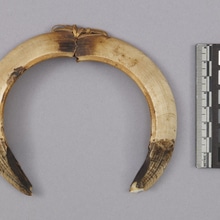
Arm Ornament
MOA: University of British Columbia
2948/53
Two boar tusks are tightly bound with rattan through single holes drilled through the root ends; tips are held widely apart. They are dark in colour and show evidence of drill holes at ends.
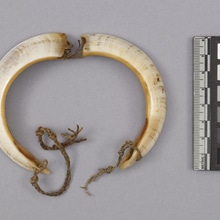
Arm Ornament
MOA: University of British Columbia
2948/52
Two boar tusks drilled at both ends, tied together through single holes at the root end with bast string. Two separate bast strings are looped through the holes at the tip ends, each knotted several times.
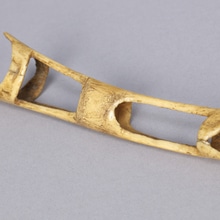
Nose Ornament
MOA: University of British Columbia
2948/50
Pig bone nose ornament, noticeably wider at one end. A broad ring has been carved at centre, with long arches on both sides of the bone, forming ends that appear as crescents from the front or as arrow points from a top view. The bone has been polished.
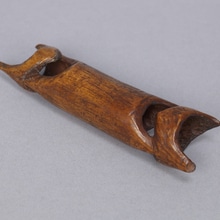
Nose Ornament
MOA: University of British Columbia
2948/48
Pig bone nose ornament, slightly curving, noticeably wider at one end. A column of over three centimetres in length has been carved at centre with crescents at its ends on opposite sides. These in turn form ends that appear as crescents from the front or as arrow points from a top view.
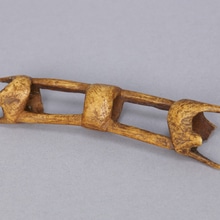
Nose Ornament
MOA: University of British Columbia
2948/47
Pig bone nose ornament. The bone has been carved to leave a central ring. On both sides two thin arms sprout on opposite sides of the ring for a couple of centimetres, culminating in molar-like shapes with four spikes.
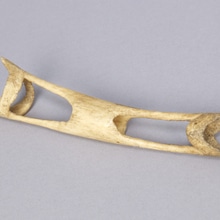
Nose Ornament
MOA: University of British Columbia
2948/46
Pig bone nose ornament, slightly curved, noticeably wider at one end. A central column of over two centimetres in length has been carved, and at its ends are long arches on opposite sides. These in turn form ends that appear as crescents from the front or as arrow points from a top view.
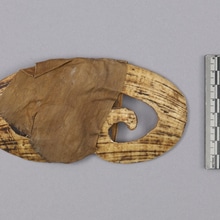
Nose Ornament
MOA: University of British Columbia
2948/41
Nose piece (Bipane) partially wrapped in a piece of sago leaf. The two shells of a clam are carved into swirls, tied together with plant fibre through a small hole in each piece and glued with beeswax. The outside shells are a light tan with dark brown striations. The underside (front) is a light...
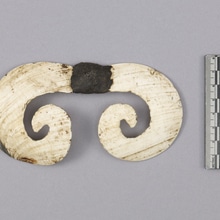
Nose Ornament
MOA: University of British Columbia
2948/40
Nose piece (Bipane). The two shells of a clam are carved into crescents, tied together with fibre through a small hole in each piece and glued with beeswax. The shells are white on both sides with striations on the outside. The striations on one of the shells shows the curving lines of the bivalv...
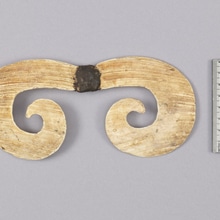
Nose Ornament
MOA: University of British Columbia
2948/39
Nose piece (Bipane). Two large shells of a clam are carved into thick concentric crescents, tied together with a bright yellow fibre through a small hole in each piece and glued with beeswax. The outside is a light tan in colour with brown striations. The underside (front) is ivory in colour. The...
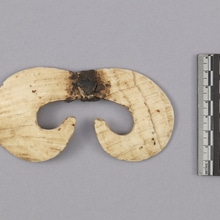
Nose Ornament
MOA: University of British Columbia
2948/38
Nose piece (Bipane). The two shells of a clam are carved into thick crescents, tied together with bast string through a small hole in each piece and glued with beeswax. Both sides of the shells are ivory in colour, with some darker striations on the outside and natural vertical lines on one shell.